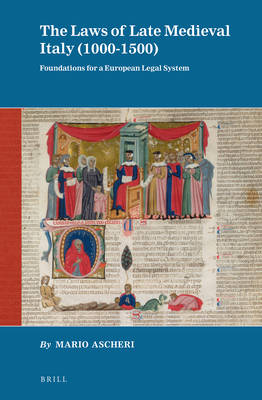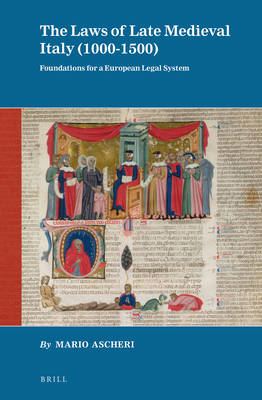
Door een staking bij bpost kan je online bestelling op dit moment iets langer onderweg zijn dan voorzien. Dringend iets nodig? Onze winkels ontvangen jou met open armen!
- Afhalen na 1 uur in een winkel met voorraad
- Gratis thuislevering in België vanaf € 30
- Ruim aanbod met 7 miljoen producten
Door een staking bij bpost kan je online bestelling op dit moment iets langer onderweg zijn dan voorzien. Dringend iets nodig? Onze winkels ontvangen jou met open armen!
- Afhalen na 1 uur in een winkel met voorraad
- Gratis thuislevering in België vanaf € 30
- Ruim aanbod met 7 miljoen producten
Zoeken
The Laws of Late Medieval Italy (1000-1500)
Foundations for a European Legal System
Mario Ascheri
Hardcover | Engels
€ 173,07
+ 346 punten
Omschrijving
In The Laws of Late Medieval Italy Mario Ascheri examines the features of the Italian legal world and explains why it should be regarded as a foundation for the future European continental system. The deep feuds among the Empire, the Churches unified by Roman papacy and the flourishing cities gave rise to very new legal ideas with the strong cooperation of the universities, beginning with that of Bologna. The teaching of Roman law and of the new papal laws, which quickly spread all over Europe, built up a professional group of lawyers and notaries which shaped the new, 'modern', public institutions, including efficient courts (like the Inquisition). Politically divided, Italy was partly unified by the legal system, so-called (Continental) common law (ius commune), which became a pattern for all of Europe onwards.
Early modern Europe had for long time to work with it, and parts of it are still alive as a common cultural heritage behind a new European law system.
Early modern Europe had for long time to work with it, and parts of it are still alive as a common cultural heritage behind a new European law system.
Specificaties
Betrokkenen
- Auteur(s):
- Uitgeverij:
Inhoud
- Aantal bladzijden:
- 444
- Taal:
- Engels
Eigenschappen
- Productcode (EAN):
- 9789004211865
- Verschijningsdatum:
- 11/07/2013
- Uitvoering:
- Hardcover
- Formaat:
- Genaaid
- Afmetingen:
- 163 mm x 241 mm
- Gewicht:
- 807 g

Alleen bij Standaard Boekhandel
+ 346 punten op je klantenkaart van Standaard Boekhandel
Beoordelingen
We publiceren alleen reviews die voldoen aan de voorwaarden voor reviews. Bekijk onze voorwaarden voor reviews.











